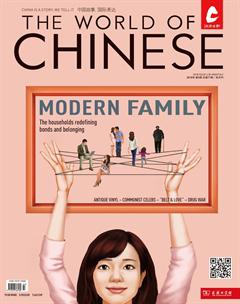ALL THE SINGLE LADIES
韩儒博
In the publishing world, “provocative” usually means good, “controversial” is better, and “banned” almost guarantees “bestseller.” On the other hand, “social media sh*tstorm,” can go either way—depending on whos kicking it up.
The publication of Roseanne Lakes Leftover in China: The Women Shaping the Worlds Next Superpower, was greeted with a social media squall over attribution—or the lack of it. Sayres Law dictates that academic cockfights are vicious “precisely because the stakes are so small”; replace “academia” with “China experts” and the comparison holds firm.
Lakes book comes at a contentious time for women in China. Theres sustained and increasing pressure for young females to put aside careers and settle down (in a heterosexual partnership, naturally); single mothers are officially frowned upon (see p.28); childless parents are criticized (p.40); and some lesbians marry gay men in order to fit in (p.43).
Amid myriad drawbacks, Lake argues, one benefit of the one-child policy was that it forced parents to give their daughters “more resources, opportunities, and liberties.” Many of these women grew up to be highly educated, financially independent, positive, and progressive contributors to Chinas growing economy. Yet, supposedly, those who resist the siren song of marriage being spurned and labeled shengnü (剩女), “leftover women.”
The term is prevalent in articles, studies and books on Chinese gender issues. Now, its nearly a decade old and clichéd, and one wonders whether it is still as meaningful. Lake examines the question—and studiously fails to acknowledge the considerable archive on the topic, in particular Leta Hong Fincher, whose 2014 Leftover Women: The Resurgence of Gender Inequality in China is, rightly or wrongly, often considered the benchmark work on the topic.
That controversy has been well-hashed by Twitter, leaving only the matter of relevancy: Does Lake substantially add to the canon? It may not be “Factory Girls meets The Vagina Monologues,” as the jacket gushes, but Leftover in Chinas approach of following the private lives of an engaging quartet of female subjects (plus a few others) sets it apart from Hong Finchers more rigorous or recondite musings, which included a whole chapter comparing modern and Song dynasty gender tropes.
Instead, Lake focuses on familiar topics from the Chinese dating world. We visit marriage markets in public parks and meet embarrassing mothers who pose as daughters on dating sites in order to find them a partner.
Lakes narrative style leaves her free to focus on what reporters usually do best: telling stories. Her cast (Christy, Zhang Mei, Ivy, June) is curated with almost box-ticking soap opera logic—the mistress, the PR girl, the country girl made good, and the lawyer educated overseas. Her account of modern Chinese history is solid, though resolutely superficial; the serious reader is unlikely to find a single observation or interpretation that hasnt been already made by a scholar and enthusiastically retweeted.
The books raison detre relies on its Chinese narratives—although the voice they are couched in can be, at times, irksome. The double standards and prejudices endured by these women are iniquitous, but Lakes narrative voice of “bemused American outsider” can border on condescension. Its a voice that gently but consistently reminds the reader that its subjects are perpetual victims, to be pitied and hopefully rescued, rather than agents forging their own path.
Moreover, Lake makes cultural assumptions without question or explanation: Is sajiao (撒嬌)—women deliberately pouting, whining, and throwing tantrums—simply about making male partners feel more “chivalrous” and “manly,” as she asserts? And if so, why not explain the practice in the context of Chinese society (especially as Lake assures us the idea “might sound unconscionable to most American women”)? Fortunately, due to the relatively intimate portraits of the four women, and some amusing anecdotes throughout, Leftover in China manages to stand on its own, rather than being the overcooked leftovers its title (and some critics) have suggested.

